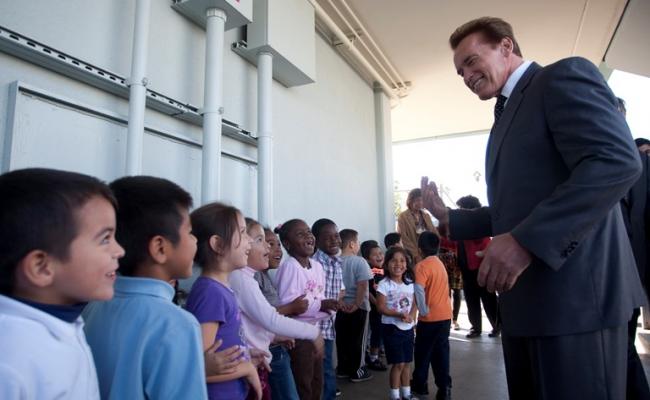Gov. Schwarzenegger’s Education Legacy: Guest commentary
By Bonnie Reiss
Ten years ago Californians rocked the nation by using a direct democracy tool and recalled a sitting governor, electing a non-politician movie action hero.
In the words of another movie star, they were mad as hell and not going to take it anymore! Fed up with politics as usual, endless budget problems and gridlock, energy brownouts and manipulations and continuously rising taxes with continually declining public services, they wanted to send a clear message to their elected officials and send Arnold Schwarzenegger, a heavyweight political outsider, to Sacramento to get things back on track.
Among the many things Californians were fed up with was their public K-12 education system. Once the envy of the world, California’s education system ranked near the bottom in the nation in preparing kids for college and the workforce, and among the highest in the nation in high school dropout rates. Schwarzenegger understood that how funds were used was just as important as the funding itself.
When Schwarzenegger took office the state had spent millions in legal fees to fight the Williams lawsuit, which asserted that the state had a constitutional responsibility to provide basic necessities like credentialed teachers, books, working bathrooms and safe buildings to all students — and which many schools in low-income areas were not doing. One of the first things Schwarzenegger asked me to do was meet with the civil rights lawyers who brought the suit, let them know he agreed that all students have this basic right, and fix the problem. I stood proudly with him when that landmark civil rights settlement for our schools was announced.
Schwarzenegger worked with leaders from both parties — from George W. Bush Education Secretary Rod Paige to greatly expand California charter schools, to Barack Obama Education Secretary Arne Duncan on Race to the Top and adopting Common Core Standards in English language arts and math.
Schwarzenegger’s long-standing commitment to fight obesity and promote fitness led to landmark legislation banning junk food in schools, setting nutrition standards for the food served and creating the first-ever physical fitness standards. After campaigning to pass the After School Education and Safety Act, Schwarzenegger worked with education leaders to pass legislation so that school districts would be ready to effectively implement a historic expansion of comprehensive after-school programs in our elementary and middle schools.
Working with bipartisan coalitions led to successes in passing a bond package providing much needed funds to build more schools and modernize others; to give more local control to school districts to decide how to best use their funds, more say in getting well-qualified teachers, more early childhood development programs; school-based health centers and the use of technology to improve education.
Schwarzenegger, himself a graduate of California community colleges, was a powerful champion for them, expanding the nursing program and career technical education.
The fight to restore California’s school system so that every student can get a world-class education — pre-K through college — is one of the biggest challenges any leader can face. Without the recall and the loud message delivered by the voters we would not be on the positive trajectory toward delivering on this promise and responsibility. It takes the tireless dedication of our teachers, principals, school boards and superintendents. It takes involved parents and committed students, and it takes courageous governors and state leaders.
I am proud to be part of continuing the governor’s work.
Bonnie Reiss is the global director of the Schwarzenegger Institute for State and Global Policy at USC and a member of the UC Board of Regents. She was senior adviser to Gov. Arnold Schwarzenegger from 2003-05 and California Secretary of Education from 2006-07.

